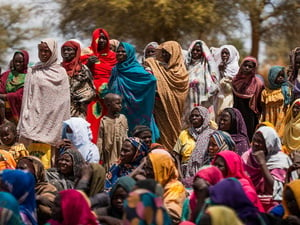Afghanistan Emergency: UNHCR staff to deploy
Afghanistan Emergency: UNHCR staff to deploy
Following the UN's green light for the return of UN expatriate staff to Herat, western Afghanistan, a team of UN international staff, including one from UNHCR, this morning crossed into Afghanistan through Iran's north-eastern border. UNHCR is now making arrangements for the deployment of five more international staff who will join some 20 local colleagues who returned to work at the UNHCR office in Herat more than a week ago.
UNHCR's immediate priority in Herat is to prepare for the distribution of relief supplies to be sent on the refugee agency's second aid convoy that will be leaving the north-eastern Iranian city of Mashad in the coming days. The supplies will include tents, cooking stoves, plastic sheeting, jerry cans and soap for more than 2,000 families, and will be distributed to displaced Afghans living in desperate conditions in camps located in and around the western Afghan city.
Conditions permitting, UNHCR expects to re-open its field offices at the border town of Islam Qala west of Herat, and also in Farah Province, further south, in the coming days. The office in Farah was looted early last week. The re-opening of these offices and deployment of staff will enable UNHCR to scale-up its quick impact projects and boost other rehabilitation activities focusing on potential areas of return for displaced Afghans still inside their homeland, as well as for refugees in neighbouring countries, particularly Iran. The rate of spontaneous returns from Iran is gathering pace, with average daily returns numbering some 1,200 persons. UNHCR and the government of Iran expect to begin large-scale returns in early spring, situation permitting.
In Kabul, UNHCR staff on Thursday continued to distribute winter kits to war-affected Afghans. More than 850 war-affected families have received the winter kits to-date, including more than 2,500 individuals who participated in Thursday's distribution. The winter packages consist of stoves, two sacks of charcoal, five blankets, three sweaters and food aid from the World Food Programme intended for seriously destitute and war-affected Afghan families, who also receive a small cash grant to transport the aid back to their homes.
UNHCR continues to pre-position relief supplies in forward sites around Afghanistan, with two flights leaving on Friday carrying 674 tents from Lahore to Mashad, Iran and a flight from Peshawar, Pakistan, bound for Kuliab, in southern Tajikistan, carrying some 500 tents.
The situation around Afghanistan's southern city of Kandahar remains unclear, but over the past few days UNHCR has seen the number of Afghans fleeing the border town of Spin Boldak nearly triple, with some 1,166 Afghans arriving Thursday at UNHCR's Killi Faizo staging site in Chaman. UNHCR greatly appreciates the flexible approach adopted by the Pakistan government towards these desperate Afghans.
Afghans arriving at Chaman say that the situation across the border is increasingly uncertain, and that they fear attacks and a breakdown in law and order in the region between Kandahar and Spin Boldak. Nearly 12,000 Afghans are currently sheltered at Roghani camp, some 16 kilometres inside Pakistan's frontier, while some 1,000 remain at Killi Faizo site and an estimated 2,000 people in the no-man's-land.









